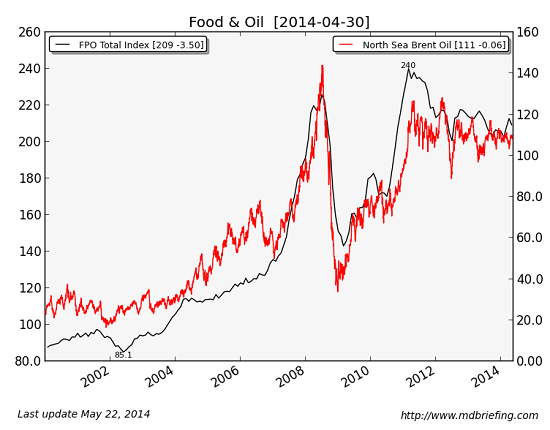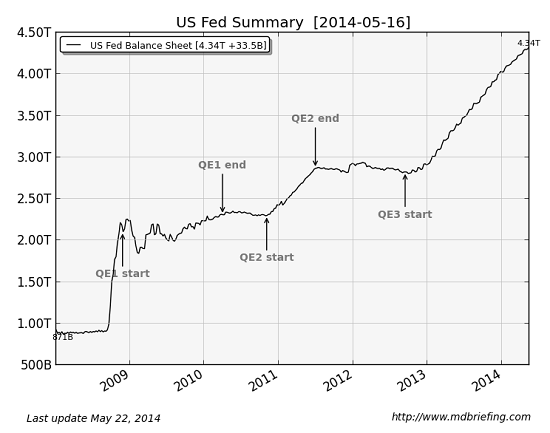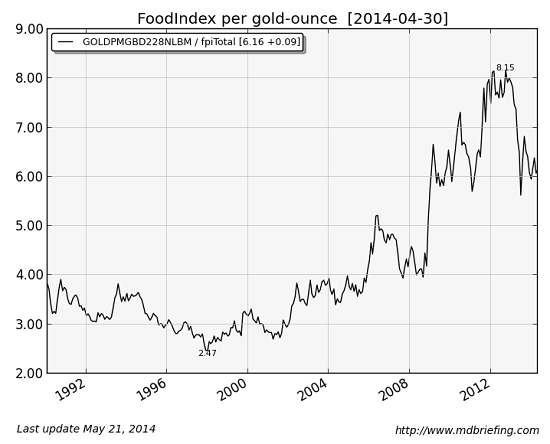Regardless of what we eat, we're actually eating oil.
Anyone who buys their own groceries (as opposed to having a full-time cook handle such mundane chores) knows that the cost of basic foods keeps rising, despite the official claims that inflation is essentially near-zero.
Common-sense causes include severe weather and droughts than reduce crop yields, rising demand from the increasingly wealthy global middle class and money printing, which devalues the purchasing power of income.
While these factors undoubtedly influence the cost of food, it turns out that food moves in virtual lockstep with the one master commodity in an industrialized global economy: oil. Courtesy of our friends at Market Daily Briefing, here is a chart of a basket of basic foodstuffs and Brent Crude Oil:
In other words, regardless of what we eat, we're actually eating oil. Not directly, of course, but indirectly, as the global production of tradable foods relies on mechanized farming, fertilizers derived from fossil fuel feedstocks, transport of the harvest to processing plants and from there, to final customers.
Even more indirectly, it took enormous quantities of fossil-fuel energy to construct the aircraft that fly delicacies halfway around the world, the ships that carry cacao beans and grain, the trucks that transport produce and the roads that enable fast, reliable delivery of perishables.
Though many observers see money-printing as the master narrative of the global economy, we don't see much correlation between the Fed's ballooning balance sheet and food/oil. If money-printing alone controlled oil (and thus food), prices of oil/food should have soared as the flood of QE3 (and other central bank orgies of credit-money creation) washed into the global economy from late 2012.
Instead, oil/food have traced out a wedge: prices have remained in a relatively narrow trading range during the orgy of money-printing.
While money creation is one influence on commodity prices, supply and demand matter, too; in that sense, money printing only matters if it pushes demand higher while constricting supply.
Other observers use gold as the "you can't print this" metric of price. In other words, rather than price grain in dollars, yuan, yen or euros, we calculate the cost of grain in ounces of gold.
The gold/food ratio is around the level it reached in 2009 after spiking in 2008.
This tells us food is cheap when priced in gold compared to 2002, but it's more expensive (priced in gold) than it was at gold's peak in 2012.
In effect, the influences of monetary inflation and supply/demand show up in food via the price of oil. Until we stop eating oil (10 calories of fossil fuels are consumed to put one calorie of food on the table), oil is the master commodity in the cost of food.
Jason Burack of Wall Street for Main Street and I discuss the changing nature of work, jobs and entrepreneurial skills: Charles Hugh Smith: Entrepreneur Skills A Must for Any Job (34 min, YouTube)
Want to give an enduringly practical graduation gift? Then give my new book Get a Job, Build a Real Career and Defy a Bewildering Economy, a mere $9.95 for the Kindle ebook edition and $17.76 for the print edition.
Get a Job, Build a Real Career and Defy a Bewildering Economy(Kindle, $9.95)(print, $20)
 Are you like me? Ever since my first summer job decades ago, I've been chasing financial security. Not win-the-lottery, Bill Gates riches (although it would be nice!), but simply a feeling of financial control. I want my financial worries to if not disappear at least be manageable and comprehensible.
Are you like me? Ever since my first summer job decades ago, I've been chasing financial security. Not win-the-lottery, Bill Gates riches (although it would be nice!), but simply a feeling of financial control. I want my financial worries to if not disappear at least be manageable and comprehensible.
And like most of you, the way I've moved toward my goal has always hinged not just on having a job but a career.
You don't have to be a financial blogger to know that "having a job" and "having a career" do not mean the same thing today as they did when I first started swinging a hammer for a paycheck.
Even the basic concept "getting a job" has changed so radically that jobs--getting and keeping them, and the perceived lack of them--is the number one financial topic among friends, family and for that matter, complete strangers.
So I sat down and wrote this book: Get a Job, Build a Real Career and Defy a Bewildering Economy.
It details everything I've verified about employment and the economy, and lays out an action plan to get you employed.
I am proud of this book. It is the culmination of both my practical work experiences and my financial analysis, and it is a useful, practical, and clarifying read.
Test drive the first section and see for yourself. Kindle, $9.95 print, $20
"I want to thank you for creating your book Get a Job, Build a Real Career and Defy a Bewildering Economy. It is rare to find a person with a mind like yours, who can take a holistic systems view of things without being captured by specific perspectives or agendas. Your contribution to humanity is much appreciated."
Laura Y.
| Thank you, Walter S. ($200), for your outrageously generous contribution to this site -- I am greatly honored by your longstanding support and readership. | | Thank you, Marvin M ($60), for your wondrously generous contribution to this site -- I am greatly honored by your steadfast support and readership. |



 Are you like me? Ever since my first summer job decades ago, I've been chasing financial security. Not win-the-lottery, Bill Gates riches (although it would be nice!), but simply a feeling of financial control. I want my financial worries to if not disappear at least be manageable and comprehensible.
Are you like me? Ever since my first summer job decades ago, I've been chasing financial security. Not win-the-lottery, Bill Gates riches (although it would be nice!), but simply a feeling of financial control. I want my financial worries to if not disappear at least be manageable and comprehensible.


























